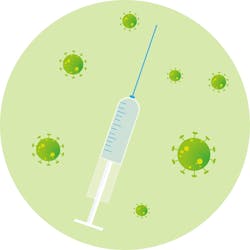New vaccines could help against respiratory illnesses
Some of the same researchers at The University of Texas at Austin who created a key to all coronavirus vaccines used in the U.S. have made a similar advance against the human metapneumovirus (hMPV), one of a handful of remaining respiratory viruses for which there is currently no vaccine, according to a news release.
The work is described in a paper published in Nature Communications.
For elderly people, the immunocompromised and babies, COVID-19 isn’t the only dangerous respiratory illness. Vaccines are still needed for many viruses that cause hospitalizations and thousands of deaths in vulnerable populations each year.
Structure-based vaccines are relatively new and, like mRNA technology, have proved to be game changing for the fight against infectious diseases, including COVID-19. Using highly detailed images of viral proteins and other parts of a virus, scientists learn to develop the ideal blueprint to include in a vaccine and train the body to recognize and fight off invading pathogens.
In the new paper, Professor of Molecular Biosciences Jason McLellan and his team describe how to engineer the hMPV fusion protein to increase its stability and usefulness in vaccines, specifically by locking it in what scientists call its prefusion conformation, or the shape of the protein before the virus enters a host cell. Without the modifications, the protein shape-shifts and assumes an alternative conformation that elicits a sixfold-lower immune response when injected into mice. The scientists stripped the viral protein of its shape-shifting ability by introducing some genetic modifications that act like molecular staples and lock the structure in the optimal form for use in a vaccine.
“Vaccines being developed with structural information and guided by that structural information really represent a wave of the future,” McLellan said. “Structural biology, protein design and engineering are used not just to fight viruses, but also other pathogens, like bacteria, and companies are ramping up their investments in these areas.”
The company Icosavax (Nasdaq: ICVX) describes plans on its website to begin clinical trials later this year for a vaccine that uses the protein mutations McLellan and the Texas team worked on for hMPV, as well as technology McLellan and colleagues at the National Institutes of Health (NIH) developed against the respiratory syncytial virus (RSV) several years ago to guard against both diseases.
McLellan is a pioneer of using structural biology and protein engineering for vaccine development. With colleagues at the NIH, he and his team designed the version of the spike protein found in many vaccines against COVID-19, and that design also uses stabilizing mutations. In 2013, he and colleagues determined how to modify a protein of RSV for use in vaccines, and vaccines based on that work are now entering the final stage of clinical trials. If approved, the vaccines would be the first against RSV.

